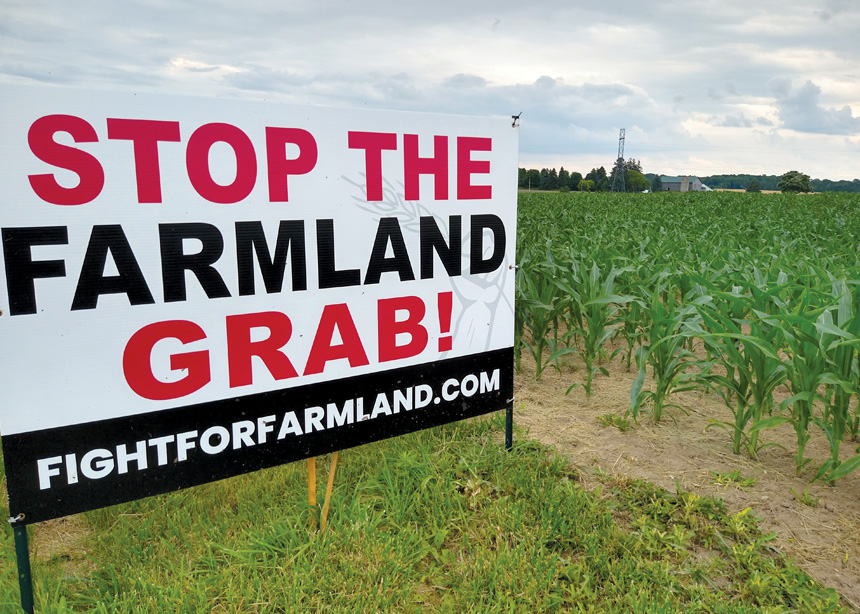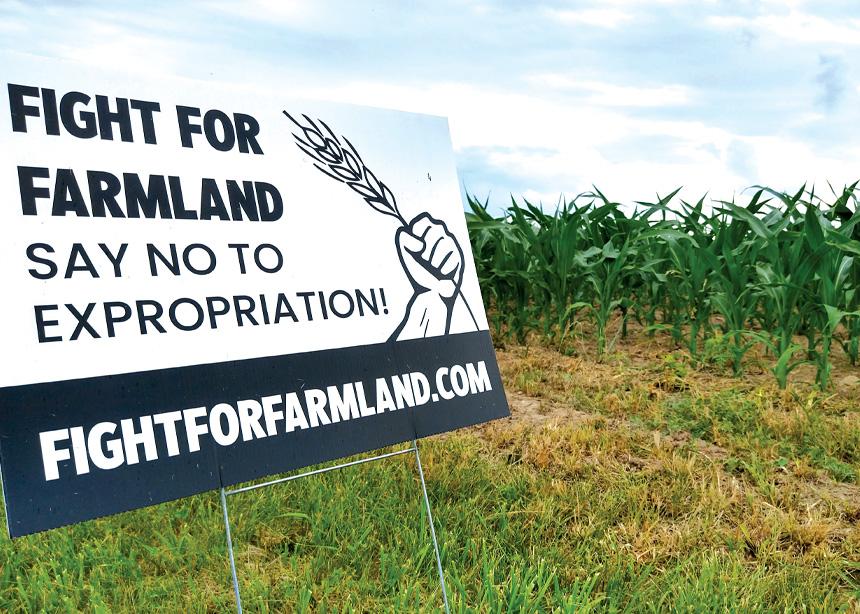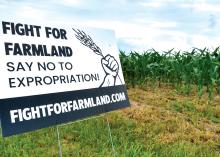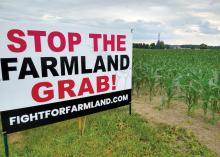On an average day, approximately 320 acres of Ontario farmland are lost to development and, apparently, now it’s our turn.
This spring, the farmers across the road from the 100-acre farm where I grew up, a 20-minute drive west of Kitchener, received a visit from an employee of an American company that handles farmland expropriations. This visitor instructed our neighbours to sell their farms, for less than the recognized market value, to the Region of Waterloo or face expropriation in August. Six farms were approached, along with six residential homes, totalling a 770-acre parcel of land.
That was in March.
With August 1 approaching as I write, the authorities have still not said what the land is to be used for, or why a parcel of land well outside the city should be developed in this way. The neighbours have certainly not sold their farms. None of us know what harvest season will look like this year.
This farmland was well protected from development until a change in provincial land conservation laws this spring. The Township and Regional Councils have been silenced under protocol, and the only clear message is a need for “shovel-ready industrial land.” The lack of transparency from the Region has been consistent and disheartening. In July, they rejected 18 of 21 of the Freedom of Information requests submitted by the group that has organized

to resist the expropriation, with statements of “no record” for the remaining three.
A close friend bought my parents’ farm operation two years ago when my parents retired. My parents still live in the house I grew up in, and I work on the farm seasonally. I was raised on this farm. I spent summers and after-school hours in the fields or making sauerkraut, and Saturdays selling our fresh vegetables at the St Jacobs Farmers Market. I now live in Waterloo with my young family, but the farm remains home. It has always been defined by rich soil and rows of cabbages and carrots.
Our home farm and the 770-acre parcel are categorized as prime farmland, meaning there are very few limits to what can be grown there. Approximately one percent of the world’s land is prime farmland. It’s a finite and precious resource. Once turned into a factory, there is no going back to this high-quality soil.
Speculation from business associations and our Chamber of Commerce (which support the expropriation) indicate the parcel may be used for an Electric Vehicle (EV) battery factory.
Ontario has 11 auto-manufacturing facilities. Another four were announced this past spring. At this rate of growth, will we have nearly 30 such facilities in 20 years?
There’s plenty to be debated over EVs, but how is a massive factory a responsible use of prime farmland?
Conservationists argue that at current development and population growth rates, in approximately 40 years we will run out of sufficient land to feed the global population.
The changes in land conservation that the provincial government made this past spring mean that any farm in Ontario could be next.
Different perspectives
I can’t write about land and ownership and expropriation without addressing our Indigenous neighbours, the same people my Mennonite ancestors displaced in order to settle here. How can we call this land ours, and fight the government
not to take it, when we are only a footnote, and a beneficiary, in the theft of this land already?
A portion of this same 770-acre parcel was set to become a new landfill for the Region in the 1980s. But the community fought back—a coordinated effort from city folks as well as the farmers and nearby towns. Instead of a new landfill, the Region piloted the first blue box recycling program, altering how our waste was disposed of, reducing the need for landfill space, and ultimately setting a new standard in environmental responsibility across the country.
Agriculture, the environment and urban development were prioritized together, instead of in opposition. That innovation took people with different skills and areas of expertise coming together to create a new idea.
That’s the cooperative innovation we need now.






Comments
Thank you, A.S. Compton, for this personal and compelling piece on the land abuse currently underway in Waterloo Region (Ontario). I am a neighbour to the troubles, and am disheartened and sickened by the government actions. You recognized Indigenous land claims, which settler people need to tend. The government's steam-rolling of its residents is a harsh reminder of how often Indigenous people have been and continue to be disrespected and mistreated. You also highlighted persistence and hope in the face of adversity, good values to lift up and strengthen. May God guide us in faithful living.
Add new comment
Canadian Mennonite invites comments and encourages constructive discussion about our content. Actual full names (first and last) are required. Comments are moderated and may be edited. They will not appear online until approved and will be posted during business hours. Some comments may be reproduced in print.